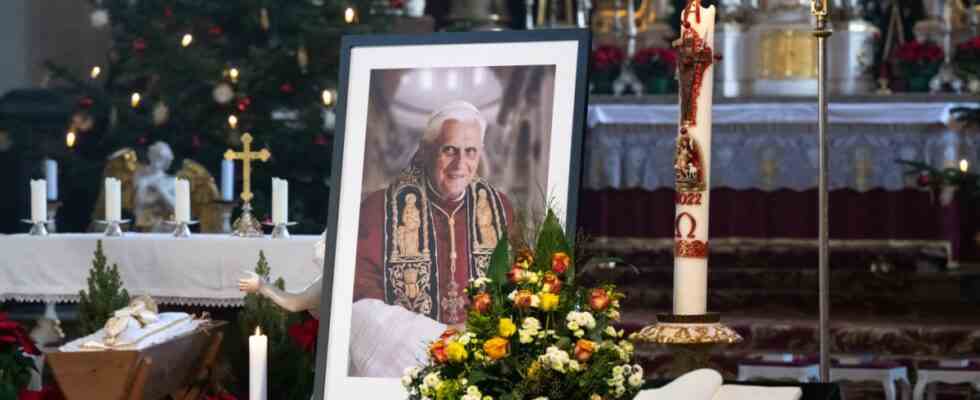The death of Benedict XVI on New Year’s Day at the age of 95 challenges the Vatican to reinvent its protocol. It is the first time that the Catholic Church has buried a retired pope. The ceremonial is not the same as that for an incumbent pope, the deceased wished it “solemn but simple”. But Joseph Ratzinger will also be laid out in St. Peter’s Basilica for three days, from Monday to Wednesday, so that the faithful can say goodbye to him from 7 a.m. to 7 p.m. And like popes who died in office, he is wrapped in a red chasuble: red is the color of mourning. Halberdiers of the Swiss Guard guard the body.
The funeral mass is scheduled for Thursday morning in St. Peter’s Square, which Pope Francis will lead. Only official delegations from Germany and Italy are invited. For comparison: 200 heads of state and government attended the Requiem of John Paul II in 2005. Rome expects 50,000 to 60,000 people to attend Benedict’s funeral. According to his own wishes, Joseph Ratzinger will then be buried in the crypt under the basilica, in the former resting place of his Polish predecessor: after his beatification, John Paul II was moved to a side chapel of the church, right next to Michelangelo’s Pietà.
After the death of Benedict XVI. the Vatican will return to normal functioning mode – with one-pointed. Perhaps this will also open up a new era in the pontificate of Francis. For almost ten years, the incumbent pope was assisted by an emeritus, unique in the history of the Catholic Church. Now, for the first time, Jorge Mario Bergoglio reigns symbolically all alone. And in Rome, one wonders whether that could motivate the 86-year-old Argentinian to press ahead with reforms that have gotten stuck and to address sensitive issues more clearly. It is considered likely that the presence of the emeritus slowed down the incumbent in his impetus. Benedict’s conservative entourage repeatedly positioned themselves against Francis’ reform plans.
New rules required
It is expected that the church will now adopt a new set of rules to avoid such double constellations after the resignation of a pope in the future. Benedict had insisted on the title “Emeritus” and appeared in papal white to the end: He contributed to the fact that many believers thought that the two popes led the church together. Is it conceivable that a resigned pope would return to the rank of cardinal? The designation “former bishop of Rome” would be possible – this would elegantly avoid any confusion: One of the many titles of the pope is “bishop of Rome”.
Personalities from all over the world paid tribute to the deceased: US President Joe Biden, himself a Catholic, said Benedict would be “remembered as a renowned theologian who dedicated his life to the Church”. Benedict “worried with soul and intelligence for a more fraternal world,” said French President Emmanuel Macron. Federal President Frank-Walter Steinmeier paid tribute to Ratzinger’s theological and academic work: “He faced up to people’s searches and questions.”
Joseph Ratzinger made “theological contributions with great acumen and intellectual succinctness that have impressed Christianity far beyond the Catholic Church,” said Annette Kurschus, Chairwoman of the Council of the Evangelical Church in Germany (EKD). The Bavarian Protestant regional bishop Heinrich Bedford-Strohm and the Magdeburg bishop Gerhard Feige also recalled that his statements about Protestantism had caused injuries among Protestant Christians.
Benedict’s handling of sexual abuse was also a topic in many obituaries. The chairman of the German Bishops’ Conference, Bishop Georg Bätzing of Limburg, said that Benedict XVI. urged “to perceive the suffering of the victims, to focus on their point of view, even though his time as Archbishop of Munich and Freising sheds a different light on him”. The spokesman for the “Eckiger Tisch” initiative for those affected, Matthias Katsch, said he was “long-standing responsible for that system” to which thousands of people affected fell victim.
Shortly after his death, the Vatican published Benedict’s “spiritual testament”. In it, the German Pope thanks everyone whom God has placed by his side and then writes that he prays that Germany will remain a “land of faith”. “Be firm in your faith! Do not be confused.” At one point he writes: “I sincerely ask forgiveness to everyone I have wronged in any way.” And at the very end: “Finally, I humbly ask: Pray for me that the Lord, in spite of all my sins and shortcomings, will admit me into the eternal mansions.”

